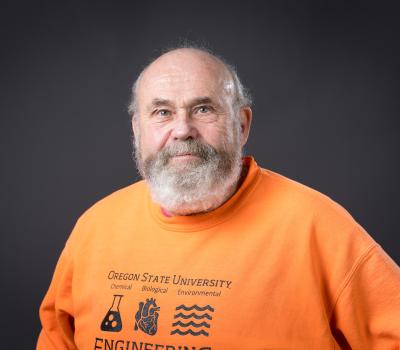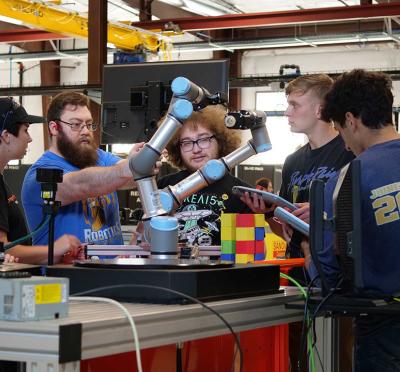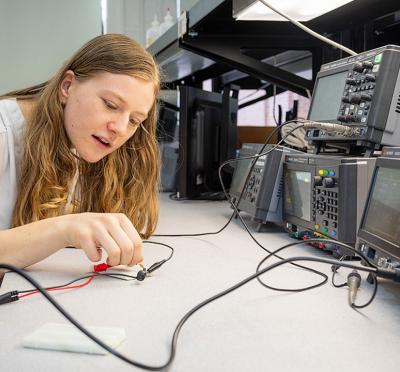Paul Nash, a polymers expert at HP’s Corvallis facility, never expected to become a teacher. Now, he looks forward to every chance he gets to lead classes.
His accidental journey into teaching began when a steadily growing number of his colleagues — particularly design engineers — sought his counsel for selecting polymers to build HP products. At some point, Nash and HP figured it would be more efficient and effective if he shared his knowledge with groups.
With modest expectations, he sent an email to about 70 people announcing a series of upcoming classes. It filled up almost immediately.
“I was astonished at how much these young people wanted to learn,” Nash said.
The classes were a hit, and his teaching role within the company gradually expanded. Then, about five years ago, Nash reached out to Skip Rochefort, associate professor of engineering at Oregon State University.
“I said ‘I hear you’re the polymers guy over there; let’s compare notes about teaching,’” Nash said. “Skip thought I could bring a tangible industry perspective to students and give them an idea of how the work really gets done on the job. I also thought I could help them prepare themselves better for the transition between school and work, which can be quite challenging. It’s important that they’re able to put their knowledge into practice quickly once they join the workforce.”
At first, Nash taught at a few of Rochefort’s classes each quarter. Then it was six, then 16, and eventually half of the sessions during some quarters. In 2023, the College of Engineering designated him as courtesy faculty, allowing him not only to continue as a guest lecturer, but also to sit on committees that evaluate graduate student theses.
“I really enjoy teaching, and I plan to continue,” said Nash, who receives no payment for any of his work at Oregon State. “The students are sharp, and they’re excited to learn. It’s really been a pleasure. I see this as just my way of giving back a little.”
Collaboration with HP yields ‘major breakthrough’
Twice in the past three years, a highly competitive seed-grant program has funded collaborative research by Rochefort and Nash.
The seed-grant program, jointly funded by the College of Engineering and HP, awarded $30,000 to each project.
Rochefort enlisted two graduate students, Aaron Chen and Rudresh Mahambre, to conduct much of the hands-on research for the first project. The two worked together to develop a fast, reliable test to ascertain the material characteristics of recycled plastics that might be used to manufacture bottles for HP’s printer ink.
“Post-consumer plastic can come from anywhere, so you have to characterize it to see if it meets the criteria for making bottles,” Rochefort said. “But until now, there’s been no way to know if the plastic would make a good bottle before actually trying to make it.”
The researchers tested about 40 different types of recycled plastic to establish which ones would be appropriate for making bottles. Then they developed a test to determine which types would be suitable for manufacturing.
“This work represents a major breakthrough for HP, because eventually we’ll be producing tens of millions of ink bottles each year and incorporating an increasing amount of recycled plastics,” Nash said. “Because of this research, we’ll be able to reach our 2025 goal of having all of our plastic bottles contain at least 30% recycled material.”
Chen, who used the research as the foundation for his thesis, earned his master’s degree in chemical engineering in 2022 and currently works as a research engineer with Entek in Lebanon, Oregon. Mahambre earned his master’s in chemical engineering in 2021 and now works at Intel in Hillsboro.
Two more graduate students were brought onboard for the second project, devising robust inner liners for molded fiber bottles. Molded fiber is compostable, but it can’t contain printer ink without an ink-proof liner. The ideal material would be both compostable and impermeable to ink.
The two students assigned to the project, Elaine Sim and Rustem Faskhutdinov, tested more than a dozen polymeric compounds to figure out if they’d fit the bill. Their work ended in March 2024, and the results are still being evaluated. Sim and Faskhutdinov both recently earned their master’s degrees in chemical engineering.




